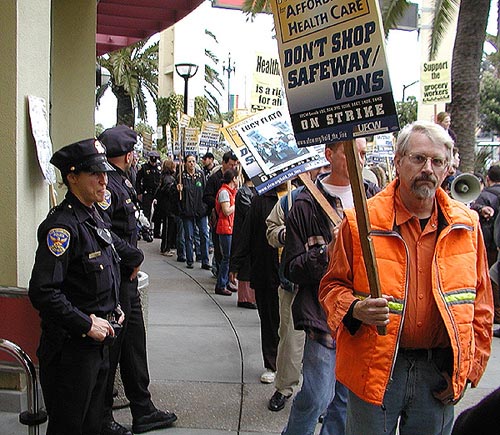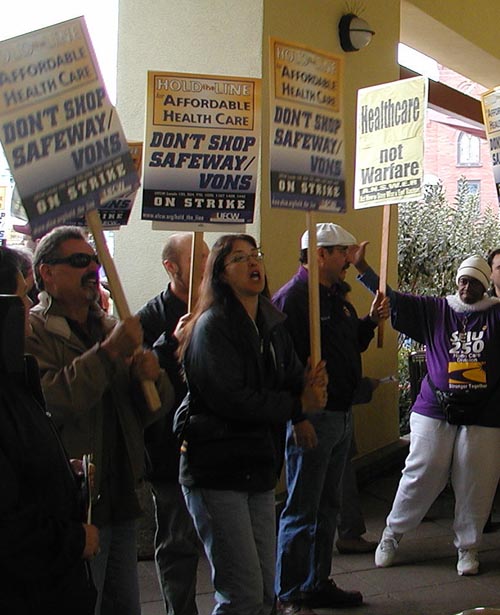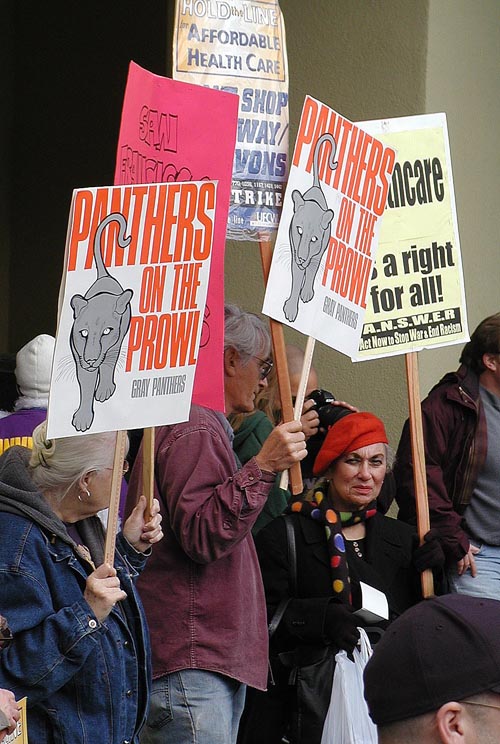Advocates
History
Issues
Newsletter

of San Francisco
Supporting Striking Grocery Workers
On January 24, 2004, hundreds of determined demonstrators picketed the Market/Castro Safeway store in San Francisco in support of 70,000 Southern California grocery workers on strike to protect their health benefits and stop imposition of a vicious two-tier wage system by which new hires would be paid a fraction of the wages of current workers. Demonstrators occupied the parking lot, picketed the story, and briefly sat in, forcing the cops to lock the doors. For more on the strike issues, see below.
The strike was eventually broken, though
20,000 strikers were actively picketing after four months. The contract
for Northern California grocery workers wil expire in September 2004.
A strike against the same take-aways seems certain. Gray Panthers in Northern
California and hundreds of other organizations pledge to help.



The United Food and Commercial Workers union (UFCW) is urging a nationwide boycott of Safeway stores in support of striking southern California grocery workers.
Strike supporters with signs and leaflets are at the entrances of the three main San Francisco Safeway stores from 11 AM to 7 PM every day but Thursday. They are asking for people to show up and help them. In addition, they are asking for people to call Safeway to say they will not shop there, and to give money for strike support.
The fact that food, auto, communications and janitorial workers are having to strike to preserve health benefits shows that we need quality, universal, single-tier, single-payer, health care. Everyone deserves health care, and the quality of our healthcare should not be dependent on company's profits or whims.
Since mid-October, 70,000 southern California workers at some of the nation's
largest grocery chains have been on strike to fight off one billon dollars
worth of contract take-backs. Safeway-owned Von's, Kroger-owned Ralph's,
and Albertson's are demanding that the United Food and Commercial Workers
(UFCW) sign contracts including:
* For current workers, health plan premiums of $780/year for families, with caps on health benefits.
* For current workers, a two-year wage freeze. Currently, baggers make $296 a week after 30 months. The average for southern California grocery workers is $375 per week.
* For new hires, a lower tier of health benefits. Employer contributions would be about $174 per month or $2,100 per year, compared with about $5,000 per year current employer contributions that workers have been getting.
* For new hires, a lower tier of wages, with no eligibility for pension plans. New cashiers would get $10 an hour after 30 months and $15.10 per hour after 8 years, as opposed to the current $17.90 per hour maximum.
These attacks on Southern California grocery workers are part of a national struggle, with strikes this past fall at grocery chains in the Midwest, and with northern California contracts expiring in September 2004.
Workers all over the country realize the outcome of the southern California grocery strike will set the pace for contract negotiations on their own jobs. The grocery chains want to reduce their labor expenses to those of Walmart, whose wages and benefits are so low that it distributes information on how to get food stamps and temporary welfare. The struck grocery chains are very profitable but they see cutting wages and health benefits as a chance to expand.
On one side, the huge grocery chains are acting in concert. When 21,000 Vons workers struck and picketed, Ralph's and Albertson's locked 59,000 of their workers out. Ralph's and Albertson's are not being picketed, and are planning to share their excess profits with Safeway's Von's, which is being picketed. The grocery chains also have withheld some $80 million in health benefits payments for November and December, so the union's health fund is about to run out of money, terminating health benefits for workers.
On the other side, workers and their unions are moving
toward greater strength and less accommodation. More than 8,000 Teamsters
abandoned 10 state-of-the-art distribution centers and delivery routes
to 860 stores throughout Southern California. The International Longshore
Workers Union pulled 3,000 members off the San Pedro docks to hold a union
meeting in front of an Albertson's store. Unionized janitors staged a
three-day hunger strike over Thanksgiving, and the entertainment unions
also held rallies. Many parking lots are virtually empty. On the other
hand, UFCW is only picketing Safeway's Von's, the "worst" chain,
and has temporarily removed picket lines in "shows of good faith."
Things are in balance. How strong the strike grows depends on how much
support the workers get from customers and other unions.